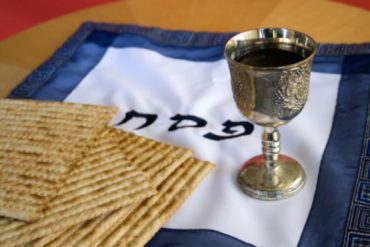What Makes Someone an Orthodox Jew?
Dear Jew in the City,
What is the exact definition of an Orthodox Jew? I see that some men have peyos and some women wear pants. Some seem to be very strictly kosher while others eat dairy in non-kosher restaurants. Where is the border?
Confused by Orthodox Jews
Dear Confused-
To answer this question, we need a bit of a history lesson.
The word “Orthodox” doesn’t appear in the Tanach, the Talmud or the Shulchan Aruch. In Jewish thought, there are simply Jews and the Torah applies equally to all of them. This idea is expressed in numerous verses, including “There shall be one Torah for those who are born Jewish and for the converts who dwell among you” (Exodus 12:49) and “You shall have one law for yourselves…” (Leviticus 24:22), among others.
This doesn’t mean that everyone was equally knowledgeable or observant. Even in Bible times, there were more observant people and less observant people – the prophets wouldn’t have chastised them for Sabbath-violation, idolatry or acts of violence if such were not the case! Similarly, throughout the Talmud, we see that some people could be depended upon when it came to separating tithes or observing the laws of ritual purity, and others could not. There were always “frum” people and “not-so-frum” people, but they were all simply “Jews.”
This changed in modern times with the introduction of Reform Judaism. (I’m going to have to oversimplify, and I don’t claim that this is the entirety of the history, so please feel free to read up on it more if it subject interests you.) In brief, in early 19th-century Europe, Jews were becoming citizens for the first time, so they no longer lived in ghettos and they started dressing like their non-Jewish neighbors. (In short, they were assimilating.) After Napoleon was defeated, Jews started to lose their rights and were converting to Christianity in order to retain them. The more traditional element called upon the Jews to re-segregate themselves but a new movement sought to – follow me here – reform Judaism by “modernizing” it. This included holding services in the vernacular (and with mixed seating), introducing cantors and choirs, abolishing the second day of the various festivals, and other changes. (One surprising idea was the rejection of the yearning for the return of Israel as the Jewish homeland, with Germany being seen as the “new Zion.” Clearly, in retrospect, that idea did not work out and has since been reevaluated.)
Some felt that reform was necessary but that Reform Judaism’s changes had gone too far too fast. Rabbi Zacharias Frankel, who considered himself a moderate between the traditionalists and the reformers, wrote that “the means (of change) must be applied with such care and discretion… that forward progress will be reached unnoticed, and seem inconsequential to the average spectator.” In other words, change needed to be more conservative.
So, we have an offshoot calling themselves “Reform” and a reaction to that offshoot calling themselves “Conservative.” Orthodoxy did not arise in response to those movements. Rather, it was the stream of Judaism that had always existed. “Orthodox” was the label placed upon the traditional Jews in order to differentiate them from the other streams. (After all, it wouldn’t do to simply call them “the Jews,” would it?)
Differences in theology notwithstanding – and there are some pretty significant ones – all streams of Judaism are ultimately one religion. When filling in a check box for religious affiliation, it would not be uncommon to see a dozen or more different Christian denominations listed separately, but one option for “Jewish.” Similarly, people make lateral moves between different streams of Judaism all the time without converting.
This is because Judaism sees people as Jewish regardless of their level of religious affiliation. And, under Jewish law, the same Torah applies to everyone, though some may observe more and others may observe less. “Orthodox” is an artificial construct, invented simply as a convenience to differentiate the traditional Jews from the offshoots. There is no law of Orthodoxy, there’s simply observing the Torah.
So, let’s use your example. Bob and Sally both identify as Orthodox. Bob will only eat in restaurants with certain rabbinic supervisions, while Sally will eat a salad in places with no supervision whatsoever. Bob feels that Sally’s actions are wrong. Sally either doesn’t know any better, she disagrees, she just doesn’t care. This is the way things have always been, since time immemorial: some people are more observant, others are less observant. Nowadays, however, we have the word “Orthodox” to quibble over. That label really doesn’t matter so much.
Where’s the line, you ask? Sabbath observance is generally the make-or-break determiner of observance. It has significance in Jewish law, such as defining eligibility to serve as a witness and to handle wine without concern. In terms of philosophy, Maimonides outlines thirteen “principles of faith” that Jews are expected to accept (God is One, He has no form, He gave the Torah, He rewards and punishes, etc.), though the details and parameters are beyond our scope right now.
In short, who is Orthodox? If you ask me, anyone who keeps Shabbos, self-identifies as Orthodox, and doesn’t hold any beliefs that Maimonides’ list would call heretical could qualify. If they dress differently than I do or eat in places I wouldn’t, they may be less observant (or I may be overdoing things) but that’s the way things have always been.
Sincerely yours,
Rabbi Jack Abramowitz, JITC Educational Correspondent
If you found this content meaningful and want to help further our mission through our Keter, Makom, and Tikun branches, please consider becoming a Change Maker today.








2 comments
Sort by
As I became more observant, going from nothing to Shomer to what many people call Orthodox. My “conservative” friends had ALOT to say about this, many were not supportive. I would like to point out there are HUGE differences between the movements on Halacha for life cycle type occurrences and who actually qualifies as a Jew. The only place that allows for non-orthodox Rabbinic Beit Din Authority is the United States. Conversion, marriages, and divorces are often not done according to traditional Halacha in the non-orthodox movement and are thus generally not recognized outside of the US or the conservative, reform, re constructionist movements. I know this first hand and it is long painful tale, part of which was featured on this website. I never judge another Jew, as my Rabbi says regularly, labels are for shirts not people. AND as I read another place, there are twelve tribes of Israel , go find yours and love your ‘others” as yourself.
Amen!